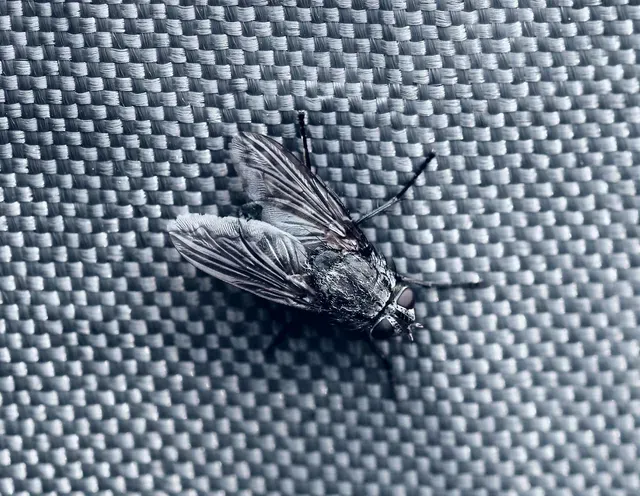What Causes Large Flies to Suddenly Show Up Indoors?
Why Do Flies Suddenly Start Invading Your Home?
If you’ve noticed an increase in large flies buzzing around your house, it can be both irritating and concerning. Flies aren’t just a nuisance—they can spread bacteria and contaminate food, making it essential to understand why they’ve shown up and how to stop them. Here’s what you need to know about common causes of fly infestations and how to prevent them. If you find the problem getting out of control, don’t hesitate to contact a pest control company to handle the situation professionally.
Understanding Flies and Their Behavior
Flies belong to a group of insects known as Diptera, which means they have just one set of wings. Different types of flies, such as house flies, fruit flies, cluster flies, and drain flies, each have their own habits and preferences for food and shelter, which play a big role in why they’re drawn to certain environments.
Flies Are Attracted to Food and Breeding Spots
Flies tend to flock to places that offer easy access to food and places to lay their eggs. House flies are attracted to rotting food, pet waste, and garbage, while fruit flies prefer overripe fruits and vegetables. Drain flies like damp areas and clogged drains, while cluster flies are different—they breed in soil but seek out warm indoor spaces to spend the winter months.

Why Flies Enter Your Home
Rotting Organic Material
A common reason for flies to invade your home is the presence of decaying organic matter. Leftover food scraps, trash, and compost piles are perfect breeding grounds for flies. Adult flies lay eggs in these materials, leading to a surge in fly numbers as the larvae mature.
Warm Indoor Temperatures
Flies thrive in warm conditions, which speed up their life cycle. If the inside of your house provides warmth, especially in spots like the kitchen or bathrooms, flies will quickly take advantage of the environment to breed and multiply.
Openings in Your Home’s Structure
Small cracks, gaps in windows, or loose-fitting doors can allow flies to enter your home with ease. Cluster flies, in particular, use these entry points to find cozy spaces inside your home, often hiding in attics or wall cavities until the temperature rises and they become active again.
Different Fly Types and What Attracts Them
- House Flies: House flies are the most common type you’ll see inside homes. They’re drawn to decaying organic materials like garbage and pet waste, and they lay eggs in damp areas, which can quickly lead to large infestations.
- Cluster Flies: Cluster flies are often mistaken for house flies but can be recognized by their slower flight patterns. These flies are more likely to enter homes in colder weather, looking for a warm spot to hibernate during the winter months.
- Blow Flies: Larger and more distinctive due to their metallic sheen, blow flies are typically attracted to dead animals. If you find blow flies in your home, it could signal the presence of a carcass hidden somewhere nearby.

How to Prevent & Control Flies in Your Home
Keep Your Food Areas Clean
A clean home is your best defense against flies. Regularly take out the trash, wash out trash cans, and promptly pick up any pet waste. Store food in airtight containers, clean up any spills as soon as they happen, and make it a habit to disinfect food prep areas. If you're looking for an eco-friendly cleaning option, vinegar works wonders in repelling flies and keeping your home spotless.
Seal Off Entry Points
Flies often get inside through tiny openings. Check all your windows and doors for broken screens or gaps, and make repairs as needed. Seal cracks around your foundation, windows, and door frames to block any entry points. Re-caulk exterior areas to ensure there are no small spaces flies can use to sneak into your home.
Control Moisture Levels
Flies thrive in damp environments, so controlling moisture is key. Make sure to address any leaks, and avoid leaving standing water in sinks or buckets. Using dehumidifiers in places like bathrooms, kitchens, and basements can help reduce the humidity that attracts flies and disrupts their breeding.
Use Chemical Solutions When Necessary
For more severe infestations, using fly traps and insecticides can help control fly populations. Place traps near windows, doors, and other common entry points, and follow the instructions on insecticides carefully to avoid any health risks.
Why You Might Need Professional Help
While many fly problems can be handled with basic preventative steps, sometimes it's best to call in the professionals. You might need expert assistance if:
- The infestation continues despite your efforts.
- The source of the problem is hard to find or reach.
- Health or safety concerns arise due to the flies.
- You're dealing with a particularly difficult or harmful fly species.
Professional pest control services can assess the situation, identify where the flies are coming from, and apply specific treatments to eliminate the problem. They can also help you put long-term measures in place to keep flies from returning.
At Bellevue Pest Control By Bamboo, we specialize in thorough pest control solutions to protect your home from fly infestations and more. Reach out today to learn how we can help keep your home fly-free for good!
For service call: (425) 230-6855
Copyright © 2024 - Bellevue Pest Control via Bamboo All Rights Reserved
